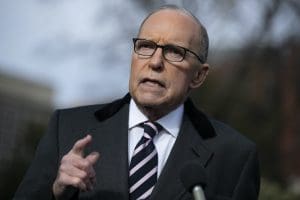Trump official says 'no second wave' of virus 1 day after another one says opposite
Peter Navarro says one thing, and then Larry Kudlow says another.

Donald Trump’s top economic adviser claimed Monday that there would be no “second wave” of coronavirus cases. A day earlier, another Trump official had said the administration was hard at work preparing for that exact scenario.
Asked about the growing number of COVID-19 cases in the United States, National Economic Council Director Larry Kudlow told CNBC on Monday that everything was under control.
“There is no second wave coming. It’s just hot spots. They send in CDC teams, we’ve got the testing procedures, we’ve got the diagnostics, we’ve got the PPE. And so I really think it’s a pretty good situation,” Kudlow claimed.
The number of new cases in the United States per day exceeded 30,000 on Friday for the first time since May 1.
Kudlow repeated his argument later in the appearance, saying, “We’ve come a long way since last winter and there is no second wave coming.”
But Peter Navarro, the director of Trump’s Office of Trade and Manufacturing Policy, said on Sunday that the administration was doing everything it could to prepare for a second wave of coronavirus infections in the fall.
“We are filling the stockpile in anticipation of a possible problem in the fall. We are doing everything we can beneath the surface, working as hard as we possibly can,” Navarro said during an appearance on CNN. “You prepare for what can possibly happen. I’m not saying it’s going to happen, but of course you prepare.”
Last week, Mike Pence published an op-ed in the Wall Street Journal under the headline “There Isn’t a Coronavirus ‘Second Wave'” in which he claimed that the media’s “panic” was “overblown” and “fear mongering.”
New data indicates that the first wave of coronavirus infections in the United States is not yet over. The Washington Post reported on Monday that 29 states and territories have reported increasing seven-day averages for the number of confirmed new cases. These spikes have come as social distancing requirements have been eased in many states and cities.
While public health experts have warned that a possible second wave after the first one is possible, Trump has repeatedly suggested the problem will miraculously just vanish.
“We’re very close to a vaccine and we’re very close to therapeutics, really good therapeutics,’ Trump told Fox News last week. “But even without that, I don’t even like to talk about that, because it’s fading away, it’s going to fade away, but having a vaccine would be really nice and that’s going to happen.”
Experts say a vaccine is unlikely before 2021.
Published with permission of The American Independent Foundation.
Recommended

Biden campaign launches new ad focused on Affordable Care Act
Former President Trump has said he wants to do away with the popular health care law.
By Kim Lyons, Pennsylvania Capital-Star - May 08, 2024
Ohio doctors fear effects of emergency abortion care case set to go before U.S. Supreme Court
A federal law that allows emergency departments to treat patients without regard to their ability to pay will be under U.S. Supreme Court scrutiny this week, and Ohio doctors are concerned about the case’s local impact on emergency abortion care.
By Susan Tebben, Ohio Capital Journal - April 23, 2024
House GOP votes to end flu, whooping cough vaccine rules for foster and adoptive families
A bill to eliminate flu and whooping cough vaccine requirements for adoptive and foster families caring for babies and medically fragile kids is heading to the governor’s desk.
By Anita Wadhwani, Tennessee Lookout - March 26, 2024












































































